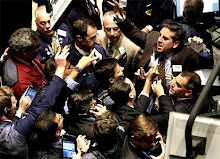FROM USA TODAY: NEW YORK -- Japan's main stock market hit a
four-month high Wednesday after the country's central bank eased
monetary policy to shore up fragile economic growth, but the positive
momentum ground to a halt in Europe.
The Bank
of Japan said it was increasing its asset purchasing fund to 55 trillion
yen ($700 billion) from 45 trillion yen to counter the strength of the
Japanese currency. A strong yen makes it more difficult for Japanese
companies to compete in international markets.
The
Bank of Japan's move comes just days after the Federal Reserve revealed
it will purchase an average of $40 billion a month in mortgage-backed
securities until the U.S. economy shows significant improvement. The
Fed's goal is to lower long-term interest rates and encourage more
borrowing and spending. The Fed also said it plans to keep its benchmark
short-term interest rate near zero until mid-2015.
Stock
markets, which tend to respond favorably to actions targeting economic
growth, rallied sharply last week following the Fed's announcement.
However, Wednesday, outside of Asia, where Japan's Nikkei 225 stock
index rose 1.2% to 9,232.21, its highest close in more than four months,
the response to the BoJ move has been far more modest.
"Perhaps
we are seeing investors suffering from a bout of central bank fatigue,
or perhaps it is a dawning realization that, even with policymakers
dispensing cash left, right and center, there is still a slowing global
economy to deal with," said Chris Beauchamp, market analyst at IG Index.
And
it's not the biggest worry, according to the September Bank of America
Merrill Lynch's Fund Manager Survey. For the first time in 18 months,
not even Europe's debt crisis is the No. 1 "tail risk" that worry global
money managers. (A tail risk is a rare event that could cause stocks to
suffer a disproportionate drop.)
The new
megarisk is the looming fiscal cliff in the U.S., according to the
survey. The realignment in the pecking order of Wall Street anxieties
serves as a warning to Main Street investors wondering what could trip
up their investment portfolios at a time when stocks are as high as
they've been in almost five years.
The fiscal
cliff is a potential growth-crimping one-two punch of rising taxes and
government spending cuts set to kick in Jan. 1 unless Congress acts to
avoid it. The Congressional Budget Office says the U.S. economy will
suffer a recession in 2013 if lawmakers fail to act.
In
the September poll, 33% of money managers, who invest $681 billion for
clients, said the eurozone's debt crisis is their top fear, down from
48% in August. Eclipsing Europe and ascending to the No. 1 global fear
was the fiscal cliff, which got a 35% vote.
Michael
Hartnett, chief investment strategist at BofA Merrill Lynch Global
Research, says, "The upcoming election is putting these fears into
sharper focus."
In the short term, investors
likely will focus on government and private data that shows whether the
economy is gaining strength. On Wednesday, the main piece of economic
data out of the U.S. are reports on new starts for residential housing
and existing home sales figures.

